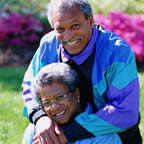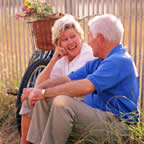3. Be Informed
Maintain a Healthy State of Mind
Seniors

Being mentally and emotionally prepared is the best way to reduce the effects of natural disaster or terrorism. Disaster disrupts our way of life and peace of mind. It can make us feel unsafe and afraid. This may increase feelings of mistrust and prejudice. You may find you react in different ways to stressful events. You may change who you will talk to or trust, or where you travel, or how you spend money. Sometimes feelings of hate towards others arise and lead to violence. This can destroy families and community life.
Although seniors have great strength from life experience, planning ahead can help decrease the risk of harm in an emergency. Planning ahead includes asking yourself the following questions:
- Do I tire easily?
- Do I need help to see, hear, or walk?
- Do I need to care for another person?
- Do I take daily medication?
Being mentally and emotionally prepared includes knowing:
- What to expect.
- When help is needed.
- How to get help.
What can I do to prepare myself now?

We've proven time and again our ability to survive everything from the Great Depression to world wars and the threat of nuclear holocaust. We've lived through droughts, floods, and all sorts of other natural disasters. We've given birth, supported our families, and stood by our loved ones through personal and financial losses. We are proud, tough and resilient.
— "Voices of Wisdom: Seniors Cope with Disasters" videotape, Project COPE, 1992
There are several things you can do ahead of time, when things are calmer, to get ready to respond to the kinds of events that a natural disaster or an act of terrorism might trigger. For example, you could—
- Make a plan with family or household members. Decide how to stay in touch if something goes wrong. Set up a meeting place .
- Prepare a disaster supplies kit. Keep it in a safe, easy-to-find place.
- Keep a spare pair of eye glasses and extra medicine handy in case you need to leave your home quickly.
- Learn about preparedness plans in your town.
- Know your neighbors and how to get in touch with them.
- Keep important documents in a safe place with easy access in case you need to leave your home.
- Review your options and decide what to do before an emergency happens.
- Know how to get in contact with service agencies you may need, such as the Area Agencies on Aging and the American Red Cross.
- Learn more about what stress does and how to deal with it.
How might I react to an extreme event?
People react differently to extreme events because everyone has a different set of past experiences. Memories and feelings you thought you had left behind may return. However, the strength of these reactions tends to disappear after a few weeks for most people. Common reactions include the following:
- Shock, numbness, and disbelief.
- Fear about personal safety, the safety of others, and pets.
- Concern about losing treasured possessions.
- Grief for those who died and for losses at earlier times in your life.
- Upsetting images, thoughts, and feelings about the event. This can happen suddenly or because something reminds you of the event.
- Anger, short temper, and increased wariness of others. This may include more arguing or fighting.
- Feeling guilty or helpless.
- Feeling restless, anxious, uneasy, or worried.
- Physical reactions can include headaches and body pains, stomachaches, appetite changes, sleep difficulties, and increased allergic reactions. Chronic health problems can get worse.
For most people, these reactions fade over time and eventually disappear.
Why are acts of terrorism so troubling?
Acts of terrorism can have such a major impact because they are
- Unexpected.
Because they seem random and often come without much warning, they can make us feel unsafe. - Unfamiliar.
We have no experience with them. This can make us feel doubtful and insecure. - Uncontrollable.
We feel unable to manage or govern such events and acts.
If a disaster occurs, how can I best deal with it?
 Talking about what happened and sharing your feelings with others you trust or who have lived through similar events can be helpful. It also is important to take care of yourself physically. This includes eating properly, taking your regular medications, and getting a good night's rest. Get back into a normal routine as soon as you can. It helps if you can find meaning in what happened or how you handled things.
Talking about what happened and sharing your feelings with others you trust or who have lived through similar events can be helpful. It also is important to take care of yourself physically. This includes eating properly, taking your regular medications, and getting a good night's rest. Get back into a normal routine as soon as you can. It helps if you can find meaning in what happened or how you handled things.
- Use the disaster plan you made.
- Find sources of information you can trust.
- Stay informed and follow official directions to protect yourself and others.
- Stay in touch with family, friends, and neighbors, if possible.
- Spend time with family and loved ones.
- Even though you need to stay informed, avoid repeatedly watching disturbing events. Watching TV or hearing radio replays of tragic events can increase anxiety and fear.
- Remind yourself of your strengths and how well you have dealt with problems in the past.
- Remind yourself that in time you will feel better.
- Be patient with others and with yourself. Take time to relax. Find a quiet place where you can collect your thoughts and feelings.
- Keep up your exercise and good health habits. Get plenty of rest.
- Ask for help when you need it.
How will I know if I need more help?
You may try all these ways to feel better and still be unable to get back to your regular routines. You might need outside help if, after several weeks or so, you:
- Still suffer greatly, longer than for other losses and events.
- Cannot concentrate or do things you used to enjoy.
- Are not able to resume normal roles with your family and friends.
- Are:
- Drinking or smoking too much.
- Using an excessive amount of prescribed medicines.
- Driving too fast or too slowly.
- Fighting, hurting, or threatening others.
- Are still having eating or sleeping problems.
- Are getting physically sick.
- Feel like hurting yourself or someone else.
How do I get help?
Asking for support may sometimes feel uncomfortable; however, seeking the assistance you need can help you cope better. Sources for assistance could include a:
- Family doctor.
- Pastoral care counselor.
- Licensed counselor or other trained mental health provider.
- Health care provider.
- Local health center or mental health clinic.
- Mental health specialty or advocacy groups.
Online resources
For more information about how to cope with natural disasters or terrorism, visit the following:
- American Association of Retired People
- American Psychiatric Association
- American Psychological Association
- American Red Cross
- American Society on Aging, Elders in Disasters
- Federal Emergency Management Agency
- National Mental Health Association
- U.S. Department of Homeland Security
This information is provided by the American Red Cross and the Centers for Disease Control and Prevention (CDC).
- Page last updated May 18, 2011
- Content source: CDC Emergency Risk Communication Branch (ERCB), Division of Emergency Operations (DEO), Office of Public Health Preparedness and Response (OPHPR)
Get email updates
To receive email updates about this page, enter your email address:
Contact Us:
- Centers for Disease Control and Prevention
1600 Clifton Rd
Atlanta, GA 30333 - 800-CDC-INFO
(800-232-4636)
TTY: (888) 232-6348 - Contact CDC-INFO


